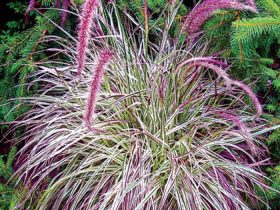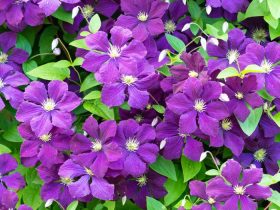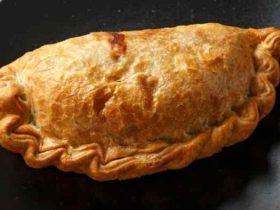Mountain Dew Composition: Bottle Of Mountain Dew Nutrition Facts
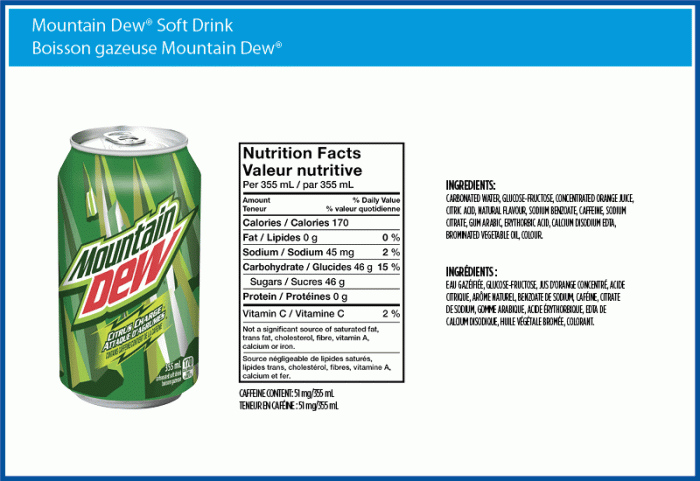
Bottle of mountain dew nutrition facts – Mountain Dew, the iconic citrus-flavored soda, boasts a complex blend of ingredients that contribute to its distinctive taste and, unfortunately, its high sugar content. Understanding these ingredients is key to appreciating both its appeal and its nutritional profile. While the exact formulations are proprietary, general ingredient lists provide a good overview of what’s inside that vibrant green bottle.
Major Ingredients in Standard Mountain Dew
The primary components of a standard Mountain Dew typically include carbonated water, high fructose corn syrup, citric acid, natural and artificial flavors, caffeine, sodium benzoate (a preservative), and coloring. High fructose corn syrup provides the sweetness, citric acid offers the tartness, and the combination of natural and artificial flavors creates that unique, slightly artificial citrus punch. Caffeine provides the stimulating kick, while sodium benzoate helps extend the shelf life.
The coloring, often yellow or yellowish-green, contributes to the visually recognizable branding. It’s important to note that the proportions of these ingredients can vary slightly depending on the production batch and location.
Ingredient Variations Across Mountain Dew Flavors
Different Mountain Dew varieties, such as Code Red and Voltage, feature modified ingredient lists to achieve their specific flavor profiles. Code Red, for instance, incorporates red coloring and artificial flavors to create its cherry-like taste. This necessitates adjustments in the balance of other ingredients to maintain the overall consistency and carbonation. Voltage, on the other hand, might include additional ingredients to enhance its electric lime flavor, potentially altering the levels of citric acid and artificial sweeteners.
These variations highlight the flexibility of the base formula and the deliberate adjustments made to create diverse flavor experiences.
Ingredient Roles and Nutritional Value
Each major ingredient plays a crucial role in shaping Mountain Dew’s characteristics. High fructose corn syrup is the main source of carbohydrates and sweetness, providing the energy but also contributing significantly to the drink’s high sugar content. Citric acid provides the tartness that balances the sweetness, enhancing the overall flavor profile. Caffeine acts as a stimulant, offering a temporary energy boost.
However, excessive caffeine consumption can lead to adverse effects such as anxiety and insomnia. Artificial flavors and colors contribute to the distinct taste and appearance, though their long-term health effects are still under investigation. Preservatives like sodium benzoate help maintain the product’s shelf life and prevent spoilage. However, some individuals may have sensitivities to these preservatives.
Comparative Ingredient List of Three Mountain Dew Varieties
The following table compares the ingredients of three different Mountain Dew varieties – Original, Code Red, and Voltage. Note that this is a simplified representation and may not include all minor ingredients or variations across different production batches.
| Ingredient | Original Mountain Dew | Mountain Dew Code Red | Mountain Dew Voltage |
|---|---|---|---|
| Carbonated Water | Yes | Yes | Yes |
| High Fructose Corn Syrup | Yes | Yes | Yes |
| Citric Acid | Yes | Yes | Yes |
| Natural & Artificial Flavors | Yes | Yes (Cherry) | Yes (Lime) |
| Caffeine | Yes | Yes | Yes |
| Sodium Benzoate | Yes | Yes | Yes |
| Coloring | Yellow-Green | Red | Green-Yellow |
Serving Sizes and Consumption Habits
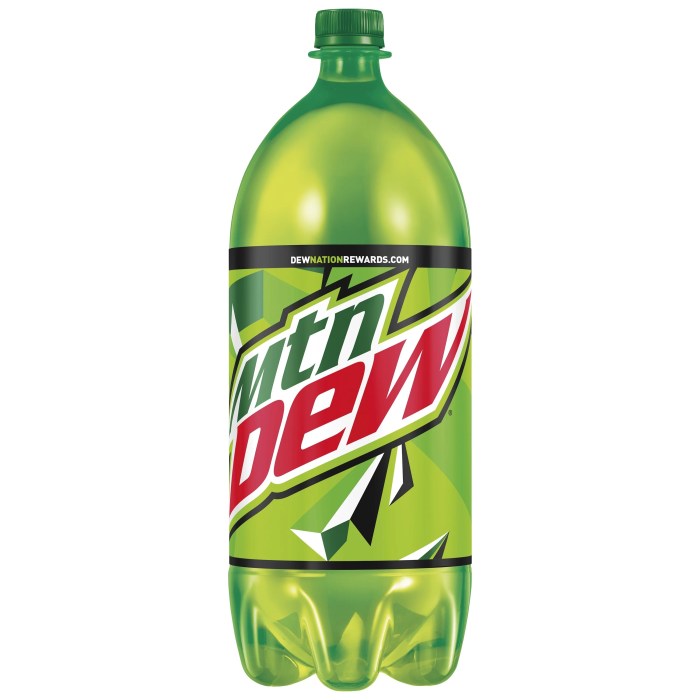
Mountain Dew, with its vibrant green hue and intensely sweet flavor, is a popular carbonated soft drink enjoyed by many. However, understanding the serving size and its impact on overall health is crucial for responsible consumption. A typical serving size of Mountain Dew is 12 fluid ounces (355 ml), a quantity often found in standard cans or bottles. This seemingly small serving, however, packs a significant caloric punch and contributes substantially to daily sugar intake.The high sugar content and substantial calorie count in a single serving of Mountain Dew have significant implications for health.
Consuming excessive amounts can contribute to weight gain, increased risk of type 2 diabetes, and dental problems due to the high sugar content. Furthermore, the caffeine content can lead to anxiety, insomnia, and digestive issues in some individuals if consumed in large quantities. Regular consumption of high-sugar drinks like Mountain Dew is linked to various health problems, highlighting the importance of moderation.
Serving Size Comparisons
A 12-ounce serving of Mountain Dew is comparable in volume to many other beverages, such as a can of soda or a standard bottle of juice. However, the caloric and sugar content differs significantly across beverages. For example, a 12-ounce can of diet soda will contain far fewer calories and sugar than Mountain Dew, while a 12-ounce glass of orange juice contains a different balance of sugars and nutrients.
Considering these differences is crucial for making informed choices about beverage consumption.
Caloric Intake from Different Serving Sizes
The following table illustrates the caloric intake from varying serving sizes of Mountain Dew, based on the approximate caloric content of a 12-ounce serving (around 170 calories). Note that these values are estimates and can vary slightly depending on the specific Mountain Dew product and its formulation.
The sugary despair of a Mountain Dew bottle, its nutrition facts a stark reminder of fleeting pleasures. A contrast arises when considering healthier options, such as the wholesome profile detailed in the rice bran oil nutrition facts , a world away from the fizzy emptiness. Yet, even the oil’s beneficial components can’t fully erase the lingering bittersweet taste of that Mountain Dew, a ghost of sugary satisfaction.
| Serving Size (oz) | Serving Size (ml) | Approximate Calories | Approximate Sugar (grams) |
|---|---|---|---|
| 12 | 355 | 170 | 46 |
| 16 | 473 | 227 | 61 |
| 20 | 591 | 284 | 77 |
| 24 | 709 | 340 | 92 |
Alternative Beverage Options
Let’s face it, Mountain Dew’s sugary punch isn’t exactly a health food champion. While it delivers that familiar caffeine kick, it’s loaded with sugar and artificial ingredients. Fortunately, there are plenty of delicious and healthier alternatives that can satisfy your thirst without the hefty sugar and calorie load. Switching to these options can significantly improve your overall health and well-being.Switching to healthier beverages can offer numerous benefits, from improved weight management and reduced risk of chronic diseases to increased energy levels and better hydration.
By making smart swaps, you can enjoy refreshing drinks without compromising your health goals.
Healthier Beverage Alternatives: Nutritional Profiles and Taste, Bottle of mountain dew nutrition facts
The following three beverages offer refreshing alternatives to Mountain Dew, boasting superior nutritional profiles and diverse taste experiences. We’ll examine their nutritional content and flavor profiles to help you make an informed choice.
| Beverage | Calories (per serving) | Sugar (per serving) | Other Key Nutrients | Taste Profile |
|---|---|---|---|---|
| Unsweetened Iced Tea | 0-5 (depending on additions) | 0-5g (depending on additions) | Antioxidants (depending on tea type) | Refreshing, slightly bitter (can be sweetened with natural sweeteners like stevia or honey in moderation) |
| Sparkling Water with Lemon/Lime | 0 | 0g | None (primarily water) | Bubbly, zesty, and naturally refreshing. |
| Infused Water (Cucumber, Mint, Berries) | 0 | 0g | Vitamins and minerals from fruits/vegetables (depending on infusion) | Light, refreshing, and subtly flavored; the flavor profile varies depending on the infusion ingredients. |
Unsweetened Iced Tea
Unsweetened iced tea provides a refreshing alternative to sugary sodas. Brewed from tea leaves, it’s naturally low in calories and sugar. Different types of tea offer varying antioxidant profiles. Green tea, for example, is known for its high concentration of catechins, potent antioxidants associated with numerous health benefits. The slightly bitter taste can be easily adjusted with a touch of natural sweetener like stevia or a small amount of honey, keeping the sugar content significantly lower than Mountain Dew.
Sparkling Water with Lemon/Lime
Sparkling water offers a fizzy and refreshing alternative without any calories or sugar. The addition of lemon or lime provides a natural zesty flavor that mimics the tartness of Mountain Dew, but without the artificial ingredients and excessive sugar. It’s a perfect choice for those seeking a low-calorie, sugar-free hydration option.
Infused Water (Cucumber, Mint, Berries)
Infused water is a simple yet effective way to create a flavorful and healthy beverage. Adding cucumber, mint, or berries to water infuses it with subtle flavors and provides added vitamins and minerals. The taste is light and refreshing, making it a perfect thirst quencher. Experimenting with different combinations of fruits, vegetables, and herbs allows for a wide range of unique and delicious flavors.
For instance, cucumber and mint create a cool and refreshing combination, while berries add a touch of sweetness without the added sugar.
FAQ Section
Does Mountain Dew contain artificial sweeteners?
Yes, many Mountain Dew varieties contain artificial sweeteners in addition to sugar.
How much caffeine is in a can of Mountain Dew?
The caffeine content varies slightly depending on the flavor and serving size, but it’s generally around 55mg per 12oz can.
Is Mountain Dew gluten-free?
Yes, Mountain Dew is generally considered gluten-free.
What are the long-term effects of drinking Mountain Dew regularly?
Regular consumption of high-sugar, high-caffeine drinks like Mountain Dew can contribute to weight gain, dental problems, and other health issues. It’s best enjoyed in moderation.
